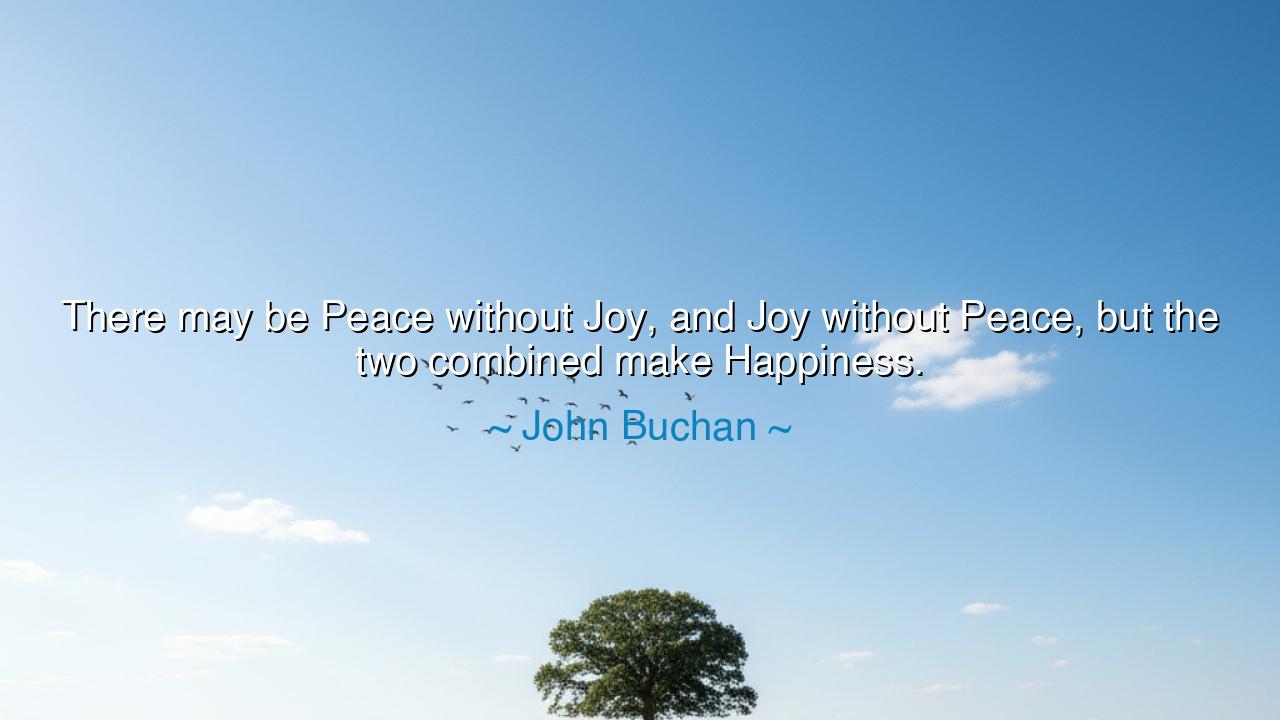
There may be Peace without Joy, and Joy without Peace, but the
There may be Peace without Joy, and Joy without Peace, but the two combined make Happiness.






The words of John Buchan—“There may be Peace without Joy, and Joy without Peace, but the two combined make Happiness”—speak with the quiet strength of a man who understood both the turmoil of the world and the stillness of the soul. In this reflection, he reveals the delicate architecture of true happiness—a structure built not from fleeting pleasures or shallow contentment, but from the twin pillars of Peace and Joy. These two forces, though kindred in spirit, are not the same. Peace is the calm of the spirit, the end of inner conflict; Joy is the song of the heart, the burst of life that lifts us beyond the ordinary. Alone, each can sustain us for a while—but only when joined do they create that rare and lasting harmony we call Happiness.
Buchan, a man of both politics and poetry, lived through the storms of the early twentieth century—a time when the world seemed to swing endlessly between war and longing. As a soldier, historian, and writer, he saw firsthand how Peace could exist without Joy—how men, weary from battle, could find silence but not laughter, survival but not warmth. He also saw how Joy could blaze even in chaos, fleeting as firelight—a mother smiling in the ruins, a soldier whistling in the trenches. But he knew that neither alone could fulfill the soul. The one without the other is incomplete: Peace without Joy becomes emptiness, and Joy without Peace becomes frenzy. Only together do they form the serene radiance of Happiness, which endures beyond both triumph and sorrow.
In the ancient world, this truth was spoken in many tongues. The Stoics of Greece sought Peace, calling it ataraxia—the stillness of the mind undisturbed by fortune or fear. Yet even they, though wise, often lacked Joy, that divine spark which gives color to existence. On the other hand, the revelers of Dionysus knew Joy, wild and unrestrained, yet they drowned in its excess, finding no Peace when the music faded. Thus, the ancients taught that wisdom lies not in the pursuit of one or the other, but in the union of opposites—the tranquil heart that still knows how to rejoice. It is this balance, this harmony between serenity and delight, that Buchan describes as the essence of Happiness.
To understand this more deeply, let us look to a story from life. Consider Nelson Mandela, who spent twenty-seven years imprisoned, his youth stolen by injustice. In that long solitude, he found Peace—not the peace of freedom, but the peace of acceptance, the mastery of anger through understanding. Yet when he emerged and saw his people cheering, he found Joy, not only for himself but for all who had suffered. The two together—the peace of the spirit and the joy of the heart—made him radiant with Happiness, even amid the scars of hardship. His life became a living lesson in Buchan’s words: that peace without joy is survival, and joy without peace is fire—but together, they create light.
This harmony is not granted easily; it must be cultivated. Many in our world chase Joy endlessly—through possessions, pleasures, and praise—only to find themselves restless and hollow. Others retreat from the world in search of Peace, yet their stillness becomes isolation, a silence too deep to bear. The wise man or woman learns to weave both into daily life—to work diligently, yet laugh freely; to find stillness amid noise, and warmth amid solitude. The ancients called this balance the golden mean—the middle path where the heart is alive but the spirit remains unshaken.
In truth, Happiness is not the absence of suffering but the marriage of Peace and Joy within the soul. It is the calm after the storm, illuminated by the light of gratitude. The person who possesses both has mastered life, for they are unbroken by sorrow and uncorrupted by excess. Their laughter is deep because it rises from still waters; their silence is peaceful because it is filled with love. They are like the mountain whose base is firm while its peak glows in sunlight—a union of strength and radiance.
So, dear listener, take this teaching to heart: do not chase happiness in the world’s distractions, nor withdraw so far that life loses its color. Seek Peace first, by reconciling with yourself and others. Practice forgiveness, patience, and simplicity—these are the roots of peace. Then, invite Joy by embracing gratitude, wonder, and the beauty of ordinary things—these are its blossoms. When you unite the two, you will find that happiness is not a place you must reach, but a state of being already within you, waiting to be awakened.
Thus, the wisdom of John Buchan endures across ages: that the soul must hold both stillness and song. Peace gives depth to Joy, and Joy gives color to Peace. Together, they form the eternal melody of Happiness—the harmony that turns existence into a blessing and transforms the passing days of life into something luminous, enduring, and whole.






AAdministratorAdministrator
Welcome, honored guests. Please leave a comment, we will respond soon